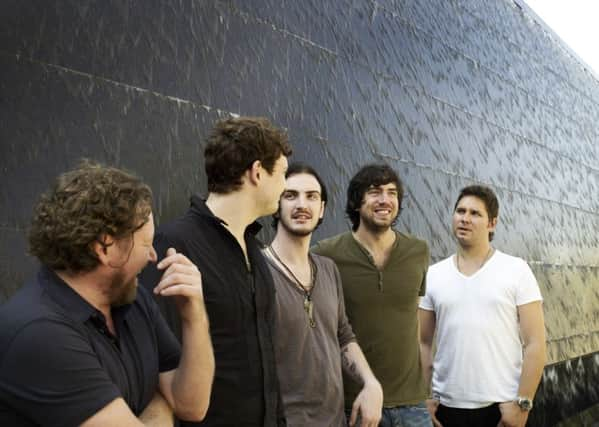Interview: Snow Patrol's Jonny Quinn on the band's first album in seven years


“Bands have split up and reformed in that time, people have put out two albums, all sorts,” says drummer Jonny Quinn. “It’s a big gap, but we just played our first gig in five-and-a-half years and there was a feeling that people were really happy we were back.”
Probably not as happy as the band themselves. Quinn admits that there was a point when he wondered if there would be a new album at all, as frontman Gary Lightbody wrestled with writer’s block over in Los Angeles while the rest of the band, mostly London-based, sat on the music they had prepared and ready to go.
Advertisement
Hide Ad“Gary didn’t feel he had something to write about, and then that became something of a mountain where he couldn’t see the top,” says Quinn. “It’s not something we would ever have put pressure on Gary to do. There was never a point when we thought he was sitting on his arse, it was more that I felt for him because I knew he wanted to write this album and he couldn’t, so it became something self-perpetuating. But there were definitely points of thinking ‘will this ever happen?’ We’ve never had that sort of break before, he’s always been so prolific.”
It has since transpired that Lightbody had plenty of potential lyrical material on his plate but needed to deal with some significant demons first. He had been self-medicating on drink and drugs for years instead of appreciating that, as he has said, “you have to put your arm around” the black dog of depression.
“He was definitely quite isolated,” says Quinn. “LA can be that sort of place, like I suppose London can be.”
In the end it was the extreme physical symptoms, alcohol-related sinus infections affecting his eyes, ears and voice, which provided the wake-up call. Acupuncture helped his physical health; psychotherapy and meditation slowly led to an improvement in his mental health, and a cleansing of those creative pores. “Then there was a big shift and after one song, two songs came out, the tap opened and the rest of the record came.”
In the meantime, a proposed two-year break after 15 years of constant touring had turned into an indefinite hiatus for Snow Patrol. “There was one point where we had done T in the Park ten years in a row, we’d played the most of any band or something crazy like that and it just felt like everyone needed a break,” says Quinn.
Inevitably, there were restless moments, and thoughts of plugging the gap with the now common practise of touring a classic album from the back catalogue. “We could have done the Final Straw tour or the Eyes Open tour,” agrees Quinn, “but I just don’t think we would do that quite yet, so it had to be something new and not repeating what we’d done before.”
Advertisement
Hide AdIn the end, everyone stepped off the traditional treadmill and took up other projects. Quinn even got himself a “proper” job, parlaying his interest in the latest music industry developments into his own publishing company, Polar Patrol Publishing, which takes a hands-on approach to artist development, and boasts the likes of Belle & Sebastian, Kathryn Joseph and Declan O’Rourke on its roster.
One of Polar Patrol’s first signings was Snow Patrol guitarist Johnny McDaid, who has written songs with the likes of Ed Sheeran, Robbie Williams and P!nk, and Snow Patrol themselves were signed up for a while. “We were but we aren’t now,” laughs Quinn. “Our manager got a better deal elsewhere!”
Advertisement
Hide AdQuinn’s role as the band’s resident industry expert goes right back to the mid-1990s when he first promoted a gig by an early incarnation of the group, called Shrug and then Polar Bear, and was subsequently invited to join the fledgling band. Quinn made the move from his native Belfast to their new base in Glasgow just as Polar Bear released their debut EP, Starfighter Pilot, on the student-run label Electric Honey.
“It was incredible coming to Glasgow from Belfast and seeing how so many bands from different genres got on with each other so well,” says Quinn. “There’s something special about that that I’ve never really seen anywhere else. In London, it’s very disjointed, there’s no one community, whereas in Glasgow there were rehearsals rooms or [music bar and basement venue] Nice’n’Sleazy where all the bands hung out and everyone put their new record in the jukebox with the white label on it. It felt like there was a centre point which you just wouldn’t have here in London.”
Back then, the newly christened Snow Patrol were more of a grungey indie proposition, who followed their Electric Honey labelmates Belle & Sebastian on to Jeepster Records. The commercial breakthrough came six years later with the Final Straw album and its epic single Run which set the band up as reliable purveyors of middle-of-the-road pop/rock anthems, a reputation they have been straining against every since.
While Wildness doesn’t quite live up to the feral connotations of its title, there is a sense of open space and possibility in the music, even as Lightbody sings of battling addiction and isolation.
“We definitely got the album we wanted,” says Quinn. “A lot of it was written on the acoustic guitar. I really like sonically the way it sounds quite different. The idea was maybe not to have the wall of guitars we’ve used before, not throw loads of strings at the production and leave a lot more space. Gary’s voice is a bit different as well. There’s a couple of songs where it sounds like he’s smoking 20, 40 cigarettes a day…But whatever happens with this record, it’s just amazing that we are together again.”
Wildness is released by Polydor Records on 25 May